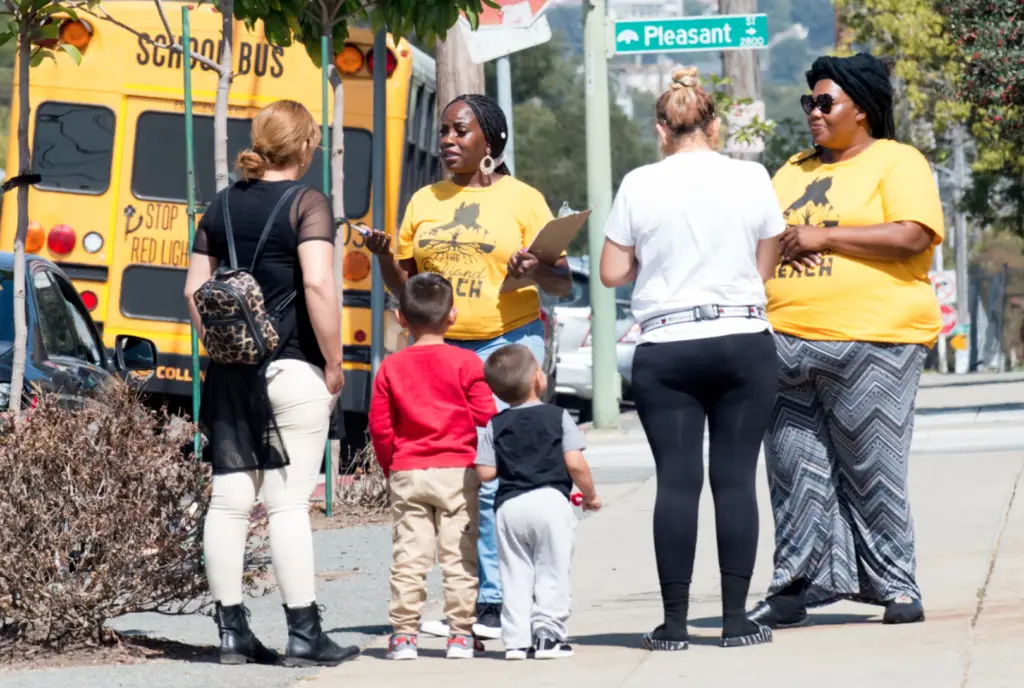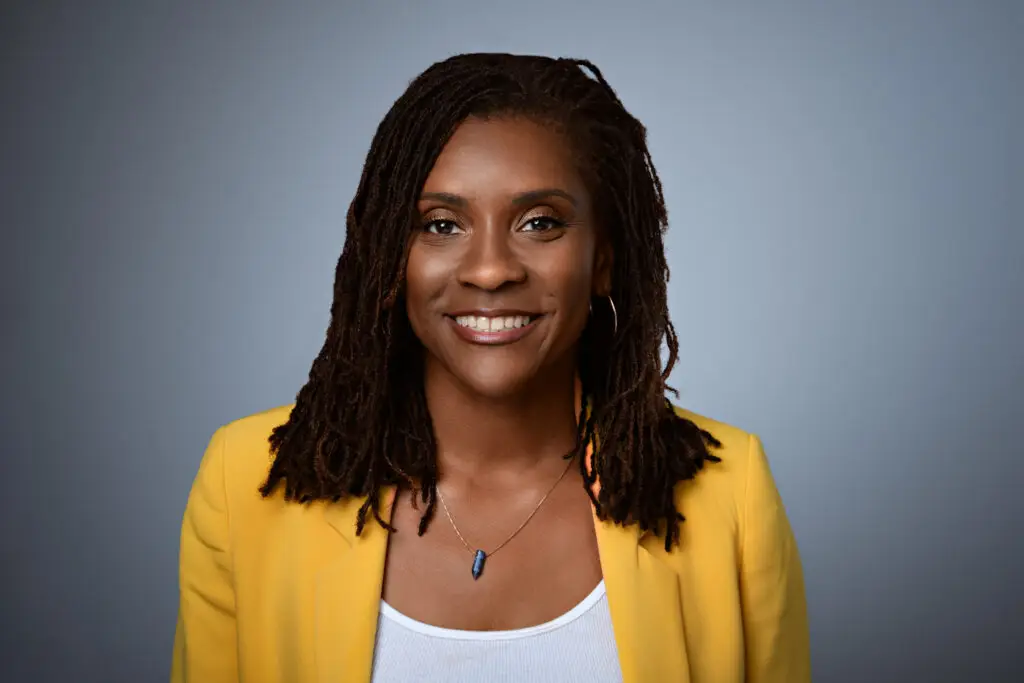People in Action: Leaders changing minds—and communities
The Center on Reinventing Public Education’s research often uncovers people with ideas or solutions that are worthy of a bigger stage. Our People in Action series offers space for leaders to explain—in their own words— how they’re addressing the critical needs of students in the hope of building a more equitable, joyful, and resilient public education system.
We invited parent advocacy leader Lakisha Young, founder and CEO of The Oakland REACH, to write a series of first-person accounts about organizing parents in Oakland, California, to work toward increasing Black and Brown student achievement. We detailed The REACH’s approach in a case study as part of our research on pandemic pods and microschools. She is currently a senior fellow at CRPE.
“Wake up. There is a problem.”
That’s how our families kicked off The Oakland REACH’s first press conference in 2017. We were a group of about 50 parents at the time—more than 90% of us were African American, and most of our children qualified for free and reduced-price lunches. About 70% of us had kids in district schools, and about 30% of us had kids in charter schools. We didn’t care what type of schools our kids attended—we just wanted them to learn. We saw Silicon Valley in our backyard, filled with high-paying jobs, and we knew that none of our kids were prepared with the skills they’d need to get a foot in the door.
We made it clear at that press conference that we were done waiting. We pledged to do whatever it was going to take to get our kids ready for good jobs and good lives. That meant creating our own solutions to get our kids reading and doing math.
People closest to the problems often know the solutions
Today, the REACH is a nonprofit that’s grown to 500 powerful parent advocates, all of whom have graduated from our fellowship program.
During our first year, we went door to door to talk to 5,000 parents in Oakland. We asked them, “Do you know how your schools are performing?” Almost all the families we met did not.
We then asked, “What kind of education do you want for your children?” Not surprisingly, all of the families wanted their children to have access to better opportunities than they had. They want their children to have a shot at a successful life and to deeply understand that a college education is a pathway to that life. They want their children to have access to an education that ensures they can read and do math well.

Once we listened to thousands of families, we were ready to work on the solutions, and we made sure families were at the table every step of the way. And this is important: We knew we couldn’t ask for solutions. We couldn’t say, “Do something!” and expect anything to change. Instead, we created our own solutions and then demanded leaders bring them to scale.
Take our first policy win: When we knew school closures looming in the 2018–19 school year would most impact our children, we created and proposed a policy named the “Opportunity Ticket,” which offered enrollment priority to the students attending schools that were closing. We wanted to ensure families most impacted by school closures could both choose and actually enroll in higher-quality schools. Essentially, we told school board members, “Do this!”
And they did. The board unanimously passed our policy in March 2019. For the first time, board members were taking cues from the poorest families, not the wealthiest. Because of this policy, when two schools closed at the end of the 2021–22 school year, families there were granted enrollment priority—and 97% of them got their first or second choice of a new school.
The pandemic accelerated our work
We didn’t stop there. Next came the pandemic, and suddenly schools were closing with no plans for how to prevent our children from falling even further behind in reading. We didn’t wait for the district to take action. We didn’t say, “Do something.” Instead, we created our own virtual Family Hub to offer high-quality literacy instruction to our students from their homes, while also providing parents with academic and socioeconomic resources and workshops. We wanted our families to thrive, not just survive. We built partnerships with dozens of Black and Brown-led organizations to offer everything from creative writing and robotics classes to martial arts and cooking lessons.
We recruited, developed, and supported families and community members to join a core of powerful literacy teachers called Literacy Liberators, who provided instruction after the school day and over the summer. And it worked. We accelerated reading gains even in the midst of a pandemic. Based on parent demand, we continued this programming through the 2020–21 school year.
We brought our success story to district leaders and urged them to partner with us to adopt our model. Together, we applied for a joint grant and were awarded $900,000 from the Center on Reinventing Public Education and TNTP (formerly The New Teacher Project). This money was critical: it let us get the work done to launch a partnership with the district and reach hundreds more families. Because of this partnership, 1,000 students have benefited from participating in Hub programming.
Our families are the closest to the problems—and that means we are also closest to the solutions. We are poised to lead. And leaders need to listen to us and trust us.
In forthcoming posts, I’ll share more about how we got families involved. How we stood in front of schools at 7 a.m. in bright yellow shirts to bring attention to academic performance. How we provided stipends to parents taking part in fellowship training. How we offered food, childcare, and transportation so they could attend those meetings. We must be realistic about what parents need in order to participate in this work.

I’ll also share what we’ve learned and what works to sustain the whole family, and I’ll explain the bold investments we attracted that sustain our work. The REACH has proven how a coordinated, multigenerational effort can get kids reading and doing math, and we want to spread the word so more communities can replicate the solutions we see working here.
Consider this your practical guide to building real solutions that change the game. We’re five years in, and we’ve got a lot to say.





Don’t Just Engage Families: Liberate Them
Lakisha Young
Founder & CEO, The Oakland REACH